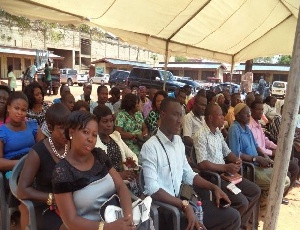Assembly members in the Central Region have called on government to consider using funds from the consolidated fund to pay assembly members to enable them perform their constitutional duties effectively.
They said for Ghana's local governance system to function properly, "assembly members must be well paid and better remunerated aside their sitting and transport allowances to carry out their mandate.
"When members are well resourced, they would be brought closer to the people to give true meaning to local participation in the governance system to improve Ghana's democratic gains".
They said decentralisation is the bedrock on which democracy and good governance thrived and it is incumbent upon government to ensure that members across the country were fully engaged to give meaning to democracy in Ghana.
The assembly members said this during the open forum at a day's workshop on the new Local Governance Act, (Act 936) in Cape Coast on Wednesday.
Some Assembly Members told the Ghana New Agency that it would be economically prudent for Government to make frantic efforts to find ingenious ways to make it happen.
They said lack of the necessary mechanisms to ensure smooth and effective functions of the assembly has had adverse effects on the effective and efficient functioning of local governance at the grassroots level.
Mr Peter Mensah, an assembly member of the Twifo Ati-morkwa District Assembly, questioned the rational behind injecting huge financial resources into organising district level elections whilst members were woefully resourced.
He said there is no well-oiled monitoring mechanisms to ensure that members were reasonably paid, supported and monitored to perform their constitutionally mandated duties.
Nana Antwi Boasiako VI, Chief of Abeadze Akyease and a Member of the Mfantsiman Municipal Assembly, said "if Members were adequately paid and better equipped with the needed information and logistics, it would enable them maintain close contact with their electoral areas.
"As it stands now, many of us do not meet our people to explain national issues and government policies to them because we do not have the financial means to do that".
"The people have been coming to us for all kinds of help including asking for tools for communal labour, yet we are not paid to meet such demands, he said."
General News of Thursday, 7 September 2017
Source: ghananewsagency.org

















